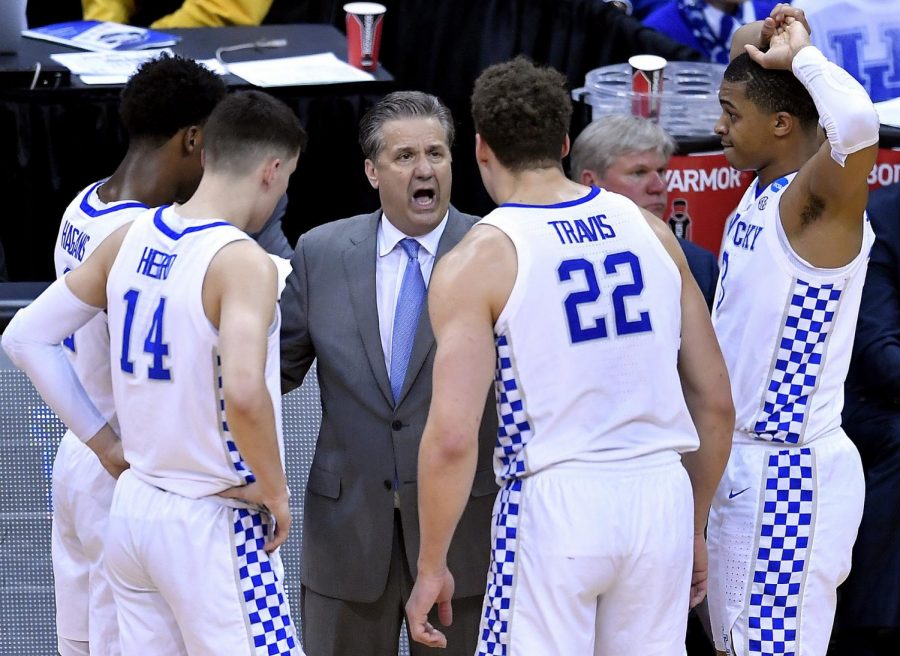Mark Story: For Kentucky, NCAA tourney ‘brackets of death’ have worked better than ‘easy paths’
Kentucky coach John Calipari talks to his players during the second half of the NCAA Midwest Regional Final on Sunday, March 31, 2019 at the Sprint Center in Kansas City, Mo.
April 4, 2019
The past two seasons, the road to the Final Four has seemed wide open for Kentucky.
In the 2018 NCAA men’s basketball tournament, the Wildcats were the No. 5 seed in a South Region that melted down in the first two rounds.
The top four seeds in the South were ousted prior to the Sweet 16. UK went to Atlanta to compete with No. 7 Nevada, No. 9 Kansas State and No. 11 Nevada for a berth in the national semifinals.
Advertisement
Alas, Kentucky could not take advantage, falling 61-58 to a middling Kansas State team whose most accomplished offensive player, Dean Wade, played only eight minutes due to injury.
This year, UK’s path to the Final Four included games against non-Power Five conference foes Abilene Christian, Wofford and Houston, plus an Auburn team Kentucky had beaten twice in the regular season.
Even though Bruce Pearl’s Tigers lost their best all-around player, forward Chuma Okeke, to a torn ACL in a Sweet 16 win over North Carolina, Kentucky again failed to parlay what seemed a favorable draw into a trip to college basketball’s final weekend.
Auburn ended Kentucky’s season Sunday with a 77-71 overtime victory at the Sprint Center in downtown Kansas City.
Sports can be funny.
For all the howling that UK Coach John Calipari has done over his belief that the NCAA Tournament Selection Committee has shown a penchant to stack the deck against the Wildcats in past years, UK has fared better in March Madness under Cal when confronted with “brackets of death.”
In 2011, Kentucky went through the team that had eliminated it from the NCAA tourney the season before (West Virginia), the tourney’s No. 1 overall seed (Ohio State) and a program that has historically had UK’s number (North Carolina) to earn an unexpected Final Four trip.
Advertisement*
Three years later, Kentucky knocked off an undefeated No. 1 seed (Wichita State), the defending NCAA champion (Louisville) and the Big Ten Conference champion (Michigan) en route to the Final Four.
The chance to motivate off “the powers that be” trying to stick it to Kentucky has worked better for Cal at UK than seeking to take advantage of golden opportunities.
Kentucky’s downfall Sunday came down to two factors.
One, Auburn’s senior guards, Jared Harper (26 points) and Bryce Brown (24), dominated UK’s all-freshman backcourt. Ashton Hagans committed seven turnovers. Tyler Herro shot 3-for-11, while Immanuel Quickley went 1-for-6.
Two, in a game that went to overtime, UK missed nine free throws (12-for-21).
That has been a recurrent theme of Kentucky NCAA Tournament losses.
When UK was upset, 73-66, by West Virginia in the 2010 Elite Eight, the Cats missed 13 foul shots (16-for-29).
In Kentucky’s 56-55 loss to Connecticut in the 2011 Final Four, the Wildcats were 4-for-12 from the foul line.
UConn’s 60-54 victory over UK in the 2014 NCAA title game saw the Cats miss 11 free throws (13-for-24).
When North Carolina edged Kentucky 75-73 on Luke Maye’s buzzer-beater in the 2017 Elite Eight, the Wildcats missed seven foul shots (12-for-19).
During the Sweet 16 loss to Kansas State in 2018, UK misfired on 14 free throws (23-for-37).
Veteran guard play and good foul shooting can cover for a lot of ills in tournament basketball.
In Calipari’s first five NCAA Tournaments as Kentucky coach (2010-12, 2014-15), UK was 22-4 with four Final Four trips and a national title.
During the past four NCAA tourneys, UK is 9-4 with no trips to the final weekend.
While those numbers would support the belief that Kentucky’s talent level in recent seasons has not been at the level it was early in the Calipari era, it also speaks to the randomness of March Madness.
Brandon Knight hit game-winning shots in the closing seconds of two games during UK’s 2011 Final Four march.
Aaron Harrison hit game-winners in three straight NCAA tourney games when the Cats unexpectedly reached the 2014 championship game.
Those games could have been as easily lost as they were won.
Conversely, Kentucky’s 2017 team (think De’Aaron Fox and Malik Monk) was good enough to win it all but lost in the region finals on a buzzer-beater.
This year’s Cats, while flawed, were in overtime one win from the Final Four.
Those games could have been as easily won as they were lost.
As the sample size grows, the breaks tend to even out.
Going forward, if the NBA follows through on its plans to lower the age-limit for entering the league’s draft to 18, Kentucky teams of the future might not be as perennially young.
UK fans should hope, yet again, for better foul shooting under tournament pressure in the future.
And, counter-intuitively, Wildcats backers maybe should wish for the selection committee to construct another “bracket of death” for Kentucky that Calipari can use as motivation.
Advertisement








